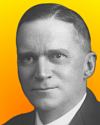
On 21 Jul 1873, Howard Barnes was born, a American-Canadian physicist whose research included aspects of ice formation, and solving problems caused by ice jams and icebergs. These can cause trouble at hydroelectric plant intakes and interfere with navigation in cold climates. You can read about understanding of the ice masses and his ideas for dealing with them in his interesting U.S. Patent, 'Method of Loosening Ice Accumulations', filed on 15 March 1925.
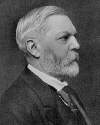
On 21 Jul 1926, Washington Augustus Roebling died, the American civil engineer under whose direction the famous Brooklyn Bridge in New York City was completed. He took over the project upon the death of his father, John Augustus Roebling in 1869, who had commenced its design and construction. Washington himself became disabled by decompression sickness after entering a caisson in 1872. He was brought out nearly insensible and his life was saved with difficulty. He supervised the operations from his home overlooking the site.
Today's book pick is: , by , who is a master historians writer who brings the past alive for his readers. In this case, his monumental book lays out the dramatic and enthralling story of the building of the Brooklyn Bridge, the world’s longest suspension bridge at the time. This tale includes greed, corruption, and obstruction — but also optimism, heroism, and determination.
David McCullough provides an enthralling story of what at the time was a challenge that required a vision and determination as great as was faced by past builders of the great cathedrals. Throughout the fourteen years of its construction, the odds against the successful completion of the bridge seemed staggering. Bodies were crushed and broken, lives lost, political empires fell, and surges of public emotion constantly threatened the project. But this is not merely the saga of an engineering miracle; it is a sweeping narrative of the social climate of the time and of the heroes and rascals who had a hand in either constructing or exploiting the surpassing enterprise.
It is available from Amazon, typically about (As of earlier time of writing - subject to change.)
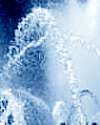 | We must look to the heavens... for the measure of the earth. |
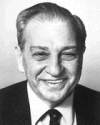 | My interest in the sciences started with mathematics in the very beginning, and later with chemistry in early high school and the proverbial home chemistry set. |
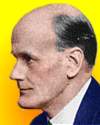 | We find it a law of our state of being that where only observation can be made the growth of knowledge creeps; where experiment can be made knowledge leaps forward. |
| Before you look at today's web page, see if you can answer some of these questions about the events that happened on this day. Some of the names are very familiar. Others will likely stump you. Tickle your curiosity with these questions, then check your answers on today's web page. | |
| Births | |
 | Rudolph A. Marcus, born 21 Jul 1923, is a Canadian-born American chemist, who won the 1992 Nobel Prize for Chemistry for his theory concerning chemical reactions. The Marcus theory describes, and makes predictions concerning, such widely differing phenomena as the fixation of light energy by green plants (photosynthesis), cell metabolism, photochemical production of fuel, chemiluminescence (“cold light”), the conductivity of electrically conducting polymers, corrosion, the methodology of electrochemical synthesis and analysis, and more. What does his theory describe to explain such reactions? |
 | Swedish chemist, Georg Brandt was born on 21 Jul 1694. He was the first person to discover a metal unknown in ancient times which he isolated as a new element in 1730. This element is used to make glass blue, is added to steel to make it harder and have a higher melting point, and traces of it are found in meat and dairy products as vitamin B-12. What is the element he discovered? |
| Deaths | |
 | A certain astronaut passed into history upon his death on 21 Jul 1998. was America's first man in space and one of only 12 humans who walked on the Moon. He became the first American into space on 5 May 1961, riding a Redstone rocket on a 15-minute suborbital flight that took him and his Freedom 7 Mercury capsule 115 miles in altitude and 302 miles downrange from Cape Canaveral, Florida. Can you name this astronaut? |
| Events | |
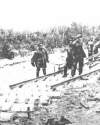 | On 21 Jul 1904, after 13 years of work, the longest railway in the world was completed, with a length of 4,607-miles. Which railway is this? |
 | On 21 Jul 2000, the first direct evidence for the third kind of neutrino known to particle physicists was announced. First generation electron neutrinos were created in 1956, and second generation muon neutrinos in 1962. What is the name of the third kind of neutrino? |
Fast answers for the previous newsletter for July 20: first optical fiber with optical losses low enough for wide use in telecommunications • dinosaur • Guglielmo Marconi • Viking 1 Lander • 1969, at the Sea of Tranquility.
 If you enjoy this newsletter, the website, or wish to offer encouragement or ideas, please send feedback by using your mail reader Reply button.
If you enjoy this newsletter, the website, or wish to offer encouragement or ideas, please send feedback by using your mail reader Reply button. Your click on a Facebook, StumbleUpon, or other social button on the site webpages is also a welcome sign of appreciation. Thank you for using them.
© This newsletter is copyright 2020 by todayinsci.com. Please respect the Webmaster's wishes and do not put copies online of the Newsletter — or any Today in Science History webpage. (If you already have done so, please remove them. Thank you.) Offline use in education is encouraged such as a printout on a bulletin board, or projected for classroom viewing. Online, descriptive links to our pages are welcomed, as these will provide a reader with the most recent revisions, additions and/or corrections of a webpage. For any other copyright questions, please contact the Webmaster by using your mail reader Reply button.
--
If you do not want to receive any more newsletters, Unsubscribe
To update your preferences and to unsubscribe visit this link
Executive Real Estate Business Class
-
"It was like a man with wings. It wasn't like anything you'd see on TV or in a monster movie." ...
About the publisher
Search This Blog
Blog Archive
-
▼
2021
(585)
-
▼
July
(50)
- Newsletter for Saturday 31 July.
- Newsletter for Friday 30 July.
- Power off and play this summer!
- Newsletter for Thursday 29 July.
- Newsletter for Wednesday 28 July.
- Newsletter for Tuesday 27 July.
- Newsletter for Monday 26 July.
- Newsletter for Sunday 25 July.
- Newsletter for Saturday 24 July.
- Newsletter for Friday 23 July.
- Newsletter for Thursday 22 July.
- Newsletter for Wednesday 21 July.
- Newsletter for Tuesday 20 July.
- Newsletter for Monday 19 July.
- The Machines That Built America Premieres Tonight
- Newsletter for Sunday 18 July.
- Newsletter for Saturday 17 July.
- Newsletter for Friday 16 July.
- Newsletter for Thursday 15 July.
- Newsletter for Wednesday 14 July.
- Newsletter for Tuesday 13 July.
- On This Day for July 12 - Geraldine Ferraro design...
- Newsletter for Monday 12 July.
- Inventing ‘The Machines That Built America’
- On This Day for July 11 - Duel between Aaron Burr ...
- Newsletter for Sunday 11 July.
- On This Day for July 10 - Telstar 1 launched, John...
- Newsletter for Saturday 10 July.
- On This Day for July 9 - Catherine the Great assum...
- Newsletter for Friday 9 July.
- New Season! Hope, Through History Podcast
- On This Day for July 8 - Vasco da Gama's first voy...
- Newsletter for Thursday 8 July.
- Ending soon: savings that pop! 🎆
- On This Day for July 7 - Hawaiian Islands annexed ...
- Newsletter for Wednesday 7 July.
- On This Day for July 6 - Anne Frank forced into hi...
- Newsletter for Tuesday 6 July.
- On This Day for July 5 - Israel's Law of Return pa...
- Newsletter for Monday 5 July.
- On This Day for July 4 - Declaration of Independen...
- Newsletter for Sunday 4 July.
- July 4th Sale at the HISTORY Store!
- On This Day for July 3 - Battle of Gettysburg ende...
- Newsletter for Saturday 3 July.
- On This Day for July 2 - Civil Rights Act signed, ...
- Newsletter for Friday 2 July.
- July 4th savings that pop!
- On This Day for July 1 - Dominion of Canada establ...
- Newsletter for Thursday 1 July.
-
▼
July
(50)
-
Blogroll
-
About
HistoryFact










0 comments:
Post a Comment